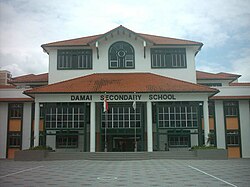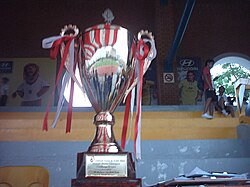| This article possibly contains original research. Please improve it by verifying the claims made and adding inline citations. Statements consisting only of original research should be removed. (July 2009) (Learn how and when to remove this message) |
| Damai Secondary School 达迈中学 Sekolah Menengah Damai | |
|---|---|
 | |
| Address | |
| 4800, Bedok Reservoir Road Bedok Singapore | |
| Coordinates | 1°20′14″N 103°55′37″E / 1.3371°N 103.9270°E / 1.3371; 103.9270 |
| Information | |
| Type | Government |
| Motto | Aspire, Explore, Achieve |
| Established | 1994 |
| Session | Single session |
| School code | 3056 |
| Principal | Chan Wan Siong |
| Colour(s) | Maroon White |
| Website | damaisec.moe.edu.sg |
Damai Secondary School (DMSS) is a co-educational government secondary school in Bedok, Singapore.
History
DMSS was established in 1994. The school has been expanded several times. In 2000, the National Education corner was added. Between 2002 and 2004 the school was upgraded under the PRIME programme, enlarging and improving the school facilities.
In 2002 and 2003, DMSS came 49th in Singapore in its express stream results. In 2002 it was awarded the People Developer Standard. This was renewed in 2005 for another three years. Its technical stream was awarded the 30th Singapore NUTMEG Prize. This was presented by the managing director, Chang Yeng Yong.
DMSS has strong emphasis on National Education (NE) and was awarded the Outstanding Development Award NE from 2006-2010. Its NE framework includes student leadership development, student-centric processes, NE integrated curriculum & establishing strategic partnerships with the community. The school was successful in creating a Borderless Learning environment in 2010 using mobile devices, WiFi & Bluetooth technology. The school's inter-disciplinary Project Work is integrated with the use of ICT. In 2008, the school introduced the use of mobile learning, using Bluetooth-enabled handphones to engage its lower and upper secondary students. The school shared its mobile learning approach at the Int'l Conference on Teaching & Learning with Technology (ICTLT) at Suntec City.
Merger with Bedok North Secondary School
Bedok North Secondary School was founded in 1981. It briefly shared a campus with Temasek Secondary School for a year before Temasek relocated to its new campus along Bedok North Avenue 3. It was relocated again on 4 December 1999 to its current premises at 20 Jalan Damai in order to accommodate the increasing number of staff and students. Due to a fall in enrolment, Bedok North was closed on 1 January 2018 and its operations merged with DMSS.
Culture and identity
Uniform and discipline
Students wear a white shirt/blouse with a maroon school tie and white trousers (for boys) or a maroon skirt (for girls). Boys in secondary 1 and secondary 2 wear short trousers before they start wearing long trousers from secondary 3 onwards.
The school uses a demerit points system to maintain discipline. Upon accumulating a certain number of demerit points, students may be subject to disciplinary actions such as detention, caning (for boys only) or suspension. In 1997, the principal James Ong told the Los Angeles Times that caning was administered at DMSS for offences such as fighting or disrespecting a teacher. "We do not seek permission from parents", he said. "We will cane first and inform you later. Parents must trust us to give the child a good education. We have the welfare of the children in mind."
School logo
Designed by Samuel Teo Gek Seng, the DMSS logo incorporates the initials DSS, forming the seed of education which is of primary importance in the formative years of young people and which when carefully planted will grow into flames of faith, hope, and charity, the three components of the school motto.
House affiliations

From 1994-2015, to encourage a competitive spirit, DMSS has a house system comprising four houses. They are the Achievers (Red), Strivers (Blue), Victors (Green), and Winners (Yellow).
At the start of every year, each new student starting in Secondary 1 is allocated by the PE department into one of these houses, based on his/her index number in class.
There are regular house meetings for the selection of new house leaders, and allowing the house members to decide if they want to join in a particular sports events on sports day. Following the house meetings there are house-related activities such as sports or quizzes.
There is a cumulative points system, strengthened by participation in sport or other events. At the end of the year, the house that has accumulated the most points is declared "house of the year", winning the trophy of the house of the year.
Campus
DMSS has a main building including a general-purpose hall, about 40 to 50 classrooms (including the Geography and History Rooms), an AV Theatre, Media Resource Library, four Computer Labs, two Physics Labs, two Biology Labs, two Chemistry Labs, Staff Common Rooms, a Canteen, a bookshop, general office, conference room, two FCE (home economics) kitchens, Retail Operations room, Design and Technology staff room, D&T Innovation Lab, a T&L lab, and a cafeteria.
There is a "Harmony Room" with exhibits on the different races in Singapore and their unique cultures, and the school's history.
Damai has developed a "wireless mobile learning environment" through the use of Bluetooth or WiFi technology. This allows students to use their smartphones (with the teachers' permission) in class to send answers to questions that their teachers sent using their own mobile phones or notebooks. This also allows students to complete assignments as many projects are to be done online, on Microsoft or PowerPoint.
Academic information
Being an integrated secondary school, DMSS offers three academic streams, namely the four-year Express course, as well as the Normal Course, comprising Normal (Academic) and Normal (Technical) academic tracks.
O Level Express Course
The Express Course is a nationwide four-year programme that leads up to the Singapore-Cambridge GCE Ordinary Level examination.
Normal Course
The Normal Course is a nationwide 4-year programme leading to the Singapore-Cambridge GCE Normal Level examination, which runs either the Normal (Academic) curriculum or Normal (Technical) curriculum.
Normal (Academic) Course
In the Normal (Academic) course, students offer 5-8 subjects in the Singapore-Cambridge GCE Normal Level examination. Compulsory subjects include:
- English Language
- Mother Tongue Language
- Mathematics
- Combined Humanities
A 5th year leading to the Singapore-Cambridge GCE Ordinary Level examination is available to students in Normal (Academic) course who perform well in their Singapore-Cambridge GCE Normal Level examination. Students can move from one course to another based on their performance and the assessment of the school principal and teachers.
Normal (Technical) Course
The Normal (Technical) course prepares students for a technical-vocational education at the Institute of Technical Education. Students will offer 5-7 subjects in the Singapore-Cambridge GCE Normal Level examination. The curriculum is tailored towards strengthening students’ proficiency in English and Mathematics. Students take English Language, Mathematics, Basic Mother Tongue and Computer Applications as compulsory subjects.
Twinning and exchange projects
In view of rising globalisation, Damai has realised the need for interaction with other schools all over the world, for more resources and better strategies.
To this end, in June 2006, DMSS entered a bilateral "sister schools" link with Dongpo Experimental Middle School (DEMS) (in Emeishan City, China) in March–June 2006. In the process, two department heads from Damai were sent to Emeishan City to visit the school, and to sign the agreement.
Twinning immersion projects have been held for some DEMS students visiting Singapore. Their activities in Singapore included curriculum immersion lessons, CCA hands-on, and NELJ. Meanwhile, administrative staff accompanying the students learned about the Singapore's education system, and the mode of operation in a typical Singaporean secondary school.
In 2009, DMSS has established an Internationalization Committee to further develop cross-cultural learning and relation-building with people of other countries.
Co-curricular activities (CCAs)

As an integral part of Singapore's educational system, DMSS has planned for suitable CCA programmes to teach pupils skills, inculcate in them the correct values and desirable social attitudes, and provide for healthy recreation. Performing groups include, Guzheng, Modern dance, School choir (Damaivoice) and Symphonic band (DamaiWindz). Sports and Games includes canoeing, netball, softball and rugby. Uniformed Groups includes The Boy's Brigade, Girl Guides, NCC, NPCC, Scouts and SJAB. Clubs and Societies includes The Art Club, Library and The Media Club.
Student Parliament
Members of the Student Parliament are known as student councillors, or simply "councillors". Entry is based on a teacher's recommendation or nomination when the student is in Secondary 1. Councillors obtain LEAPS CCA points under the "Leadership" category, and are given certain rights over other ordinary students' discipline. Councillors must wear a special school tie and a name badge with the word "Student Councillor" on it. With effect from 2008, Student Councillors, Peer Leaders and National Education Ambassadors merged to form the Damai Student Leadership body, known as Student Leaders. The Student Leaders represent the student population of DMSS and have organized many school events. The Student Leaders organize events like the Secondary 1 Orientation Camp and Teachers’ Day celebrations yearly. The Student Leaders are also actively involved in other events like the Sports Day, Meet-the-Parents sessions and Prom Ball. The Student Leaders also assist in the running of the school, which includes morning and weekly assembly duties. Student Leaders actively spread National Education messages to the student population, extend community and national outreach and promote the school image and pride.
Notable alumni
- Olivia Ong, singer
References
- Lim, Kenneth; Ng, Kelly (4 March 2016). "22 secondary schools to merge over next 2 years due to falling demand". Channel NewsAsia. Singapore. Archived from the original on 16 May 2017.
- "Clinton to US schools: Catch up with Singapore". The Straits Times. Singapore. 9 March 1997.
- "Express Course Curriculum". www.moe.gov.sg. Retrieved 14 September 2017.
- ^ "Secondary School Courses". www.moe.gov.sg. Archived from the original on 4 July 2017. Retrieved 14 September 2017.
- ^ "Normal Course Curriculum". www.moe.gov.sg. Retrieved 14 September 2017.
- "English Drama". 13 April 2016. Archived from the original on 13 April 2016.
- "Guzheng". 13 April 2016. Archived from the original on 13 April 2016.
- "Modern Dance". 13 April 2016. Archived from the original on 13 April 2016.
- "School Choir". 13 April 2016. Archived from the original on 13 April 2016.
- "Symphonic Band". 13 April 2016. Archived from the original on 13 April 2016.
- "Canoeing". 13 April 2016. Archived from the original on 13 April 2016.
- "Netball". 13 April 2016. Archived from the original on 13 April 2016.
- "Softball". 13 April 2016. Archived from the original on 13 April 2016.
- "Rugby". 13 April 2016. Archived from the original on 13 April 2016.
- "The Boy's Brigade". 13 April 2016. Archived from the original on 13 April 2016.
- "Girl Guides". 13 April 2016. Archived from the original on 13 April 2016.
- "NCC". 13 April 2016. Archived from the original on 13 April 2016.
- "National Police Cadet Corps". 13 April 2016. Archived from the original on 13 April 2016.
- "Scouts". 13 April 2016. Archived from the original on 13 April 2016.
- "St. John Ambulance Brigade". 13 April 2016. Archived from the original on 13 April 2016.
- "Art Club". 13 April 2016. Archived from the original on 13 April 2016.
- "Library Club". 13 April 2016. Archived from the original on 13 April 2016.
- "Media Club". 13 April 2016. Archived from the original on 13 April 2016.
- "Student Leaders". 13 April 2016. Archived from the original on 13 April 2016.
- "Olivia Ong's first full-length Mandarin album". www.asiaone.com. Retrieved 31 August 2021.